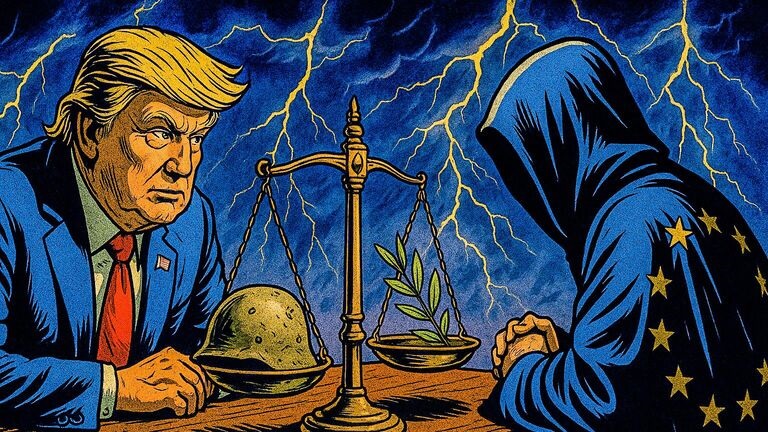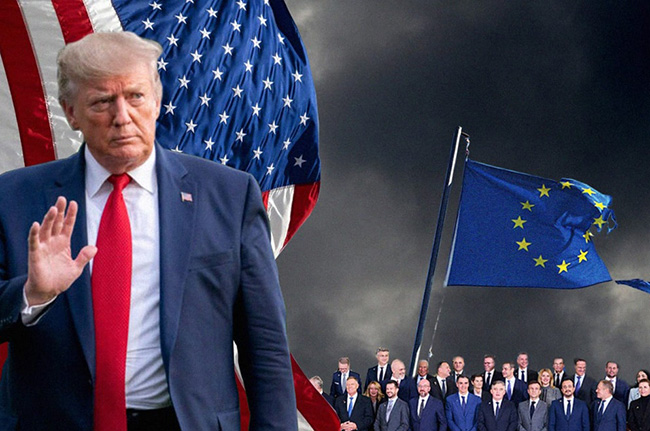 Pic.: AI from publics
Pic.: AI from publics
It has become a hallmark of this war that, whenever America turns away from him, Zelensky seeks succour from his friends in Europe. Last week’s peace plan drafted by the US is no exception, UnHerd notes.
Donald Trump’s statement that his proposal was “not my final offer” may have initially augured success for Europe, as would Keir Starmer’s claim of a “constructive” phone call with the US President. Yet the underlying circumstances are hardly propitious. However warm Europe’s words, they are likely to fall on deaf ears.
Continental leaders should feel concerned knowing that months of flattering Trump in a bid to persuade him on Ukraine have come to naught. He has not moved beyond the rhetoric of February’s Oval Office showdown, reiterating on Friday that Zelensky does not have the “cards”. One European official told the Financial Times that they are now “back to square one”, noting that Europe once again fears Washington may use the threat of cutting off support to push Zelensky towards terms amounting to capitulation.
Yet Europe is hardly in the same position: it is significantly poorer than it was at the start of the year. In an effort to placate Trump and secure a place in any peace talks, continental leaders have agreed to buy more American weaponry, offered a state visit, and pledged higher defence spending.
Despite these gestures, the White House still views Europe as peripheral, with EU chief diplomat Kaja Kallas admitting that Europe was excluded from negotiations between Washington and Moscow. That exclusion underlines the failure of a strategy built on praise and compliance. Indeed, Europe has paid a high price without buying meaningful influence. What, at this point, can it offer Trump that would earn his respect? Its position is weakened further by leaders unwilling to risk criticising the US President.
Then there are the problems with the terms Europe is proposing. Their document is entirely doomed. It crosses several of Russia’s repeatedly stated red lines, from the presence of NATO troops in Ukraine, even if not formally representing the Alliance, to leaving the door open to Kyiv’s eventual Nato membership.
It is also unrealistic to expect Moscow to agree to an unconditional ceasefire before territorial negotiations. Russia knows that Ukraine would use such a pause to regroup, and could then delay or resist difficult talks over ceding land. Besides, having seen that they can persuade the Americans to accept their more stringent demands, the Russians will see no reason to settle for anything less in future.
Geneva is a placating exercise, at which Europe may be heard but will not be listened to. Unsurprisingly, continental leaders are already downgrading expectations about their proposal, with Merz calling it a “first step” that “falls short of a complete solution” and European officials amending Washington’s proposals instead of pushing their own. Meanwhile, US Secretary of State Marco Rubio is claiming not to be aware of the counter-proposal.
 Pic.: Bloque Popular Juvenil
Pic.: Bloque Popular Juvenil
The United States and Ukraine significantly changed a controversial 28-point plan to end the war following frenzied meetings in Geneva that brought the two sides closer to an agreement after the White House pushed Kyiv to sign off on the plan by Thanksgiving.
The changes, which two officials said were much more palatable to Ukraine, could very well be less acceptable to Russia — the paradox that has long resulted in an impasse over ending the war, ‘The Washington Post’ writes.
The original draft, presented to Zelensky in Kyiv last week, made concessions to Moscow that crossed major red lines for Ukraine, spurring outrage from Kyiv and its allies, including Republicans in Congress. Zelensky and top officials have spent the past days in a diplomatic flurry to garner support for a better deal.
A U.S. delegation, led by Secretary of State Marco Rubio, and a Ukrainian team, led by the head of the presidential office, Andriy Yermak, held talks in Geneva over the weekend to hammer through changes to the proposal.
The meetings were “tense and tough” but productive, said Oleksandr Bevz, an adviser to Yermak who participated in the Geneva talks. He said the Thursday deadline now appears more flexible than it had before. “It’s not a code red. It’s more important to finalize the text.”
“Many of the controversial provisions were either softened or at least reshaped” to get closer to a Ukrainian position or reduce demands on Ukraine, he said. By Monday, while not all the language in the draft was considered entirely “acceptable” to Kyiv, Bevz said, the text was revised to a point that it could at least “be considered, whereas before, it was an ultimatum.”
The U.S. had threatened to cut all support if the deal wasn’t accepted by Thanksgiving, according to previous Washington Post reporting.
Kyiv also argued for issues involving Europe to be resolved separately and for Ukraine’s NATO aspirations to be decided based on NATO’s rules, which require consensus, essentially nixing the outright veto on membership from the earlier draft.
Zelensky has not authorized anyone except himself to discuss territorial issues, meaning little progress was made on the initial proposal that included recognition of Russian control of parts of Ukraine and a retreat of Ukrainian troops from the Donetsk region.
Zelensky and President Donald Trump are expected to further resolve some of these issues in a meeting or phone call, which has not yet been scheduled.
A European official briefed on the talks said it seemed that provisions on European security were removed from the latest draft, which focused mostly on Ukraine. The initial terms caught European officials by surprise when it leaked last week and stirred frustration that they were not consulted, the official said.
One European diplomat said there was a sense of “mystery around the current phase of negotiations” between the U.S. and Ukraine. “We are not on board. We are trying to get on board, but it is being met for the moment with some rejections from Americans.”
read more in our Telegram-channel https://t.me/The_International_Affairs

 12:02 26.11.2025 •
12:02 26.11.2025 •






















